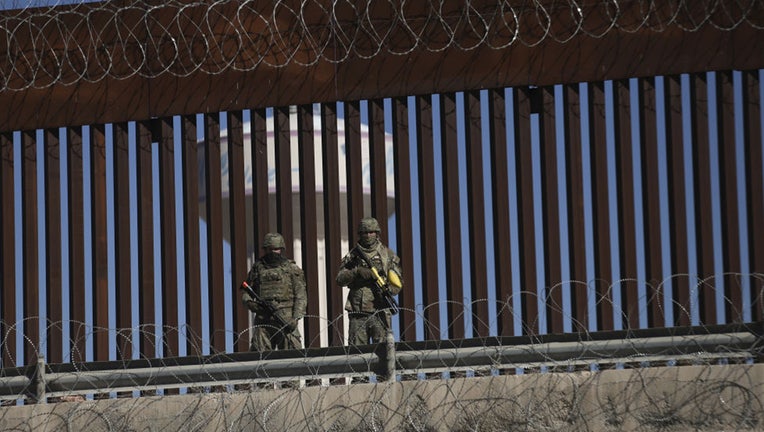The Insurrection Act: What is it and could Trump invoke it?

FILE - American authorities, Border Patrol agents and the Texas National Guard investigate the area where the tunnel between Juarez and El Paso was found in Ciudad Juarez, Mexico on Jan. 14, 2025. (Photo by Christian Torres/Anadolu via Getty Images)
WASHINGTON - Could President Donald Trump invoke the Insurrection Act of 1807?
On his first day back in office, the president signed a litany of executive orders, including one declaring a state of emergency at the southern border.
According to the order, the Secretary of Defense and the Secretary of Homeland Security have 90 days to submit a report about the conditions at the border and any recommended actions that need to be taken to secure, "including whether to invoke the Insurrection Act of 1807."
Here’s what the act is, and what it could mean if invoked:
What is the Insurrection Act of 1807?
Dig deeper:
The Insurrection Act allows presidents to call on reserve or active-duty military units to respond to unrest in the states, an authority that is not reviewable by the courts. One of its few guardrails requires the president to request that the participants disperse.
Congress passed the act in 1792, just four years after the Constitution was ratified. Joseph Nunn, a national security expert with the Brennan Center for Justice, told The Associated Press it’s an amalgamation of different statutes enacted between then and the 1870s, a time when there was little in the way of local law enforcement.
"It is a law that in many ways was created for a country that doesn’t exist anymore," he added.
It also is one of the most substantial exceptions to the Posse Comitatus Act, which generally prohibits using the military for law enforcement purposes.

VP Vance Delivers Remarks at U.S.-Mexico Border
Vice President JD Vance toured the U.S.-Mexico border Wednesday, meeting with law enforcement to highlight immigration policies that the White House says have led to fewer arrests since Trump?s second term. Accompanied by Defense Secretary Pete Hegseth and DNI Director Tulsi Gabbard, Vance is among the highest-ranking Republicans to visit the border. After a helicopter tour of Eagle Pass, they visited a Border Patrol facility and joined a roundtable discussion.
Past use of the Insurrection Act
The backstory:
Presidents have issued a total of 40 proclamations invoking the law, some of those done multiple times for the same crisis, Nunn said. Lyndon Johnson invoked it three times — in Baltimore, Chicago and Washington — in response to the unrest in cities after the assassination of Dr. Martin Luther King Jr. in 1968.
During the Civil Rights era, Presidents Johnson, John F. Kennedy and Dwight Eisenhower used the law to protect activists and students desegregating schools. Eisenhower sent the 101st Airborne to Little Rock, Arkansas, to protect Black students integrating Central High School after that state’s governor activated the National Guard to keep the students out.
George H.W. Bush was the last president to use the Insurrection Act, a response to riots in Los Angeles in 1992 after the acquittal of the white police officers who beat Black motorist Rodney King in an incident that was videotaped.
Could Trump invoke the Insurrection Act?
Almost anything and everything is on the table during a Trump presidency.
Big picture view:
He’s already fired top Pentagon officials and military lawyers, leading some critics to say the firings are an ominous sign, given that Trump has long made clear his desire to involve the military in his domestic policy goals, including his crackdown on immigration.
In Congress, which has the power to restrict the use of military force through funding and other authorizations, Republicans are largely on board with Trump’s plans.
The other side:
Democrats in Congress tried to update presidential powers like the Insurrection Act before Trump’s second term but found little success.
That left them instead issuing dire warnings that Trump now has fewer guardrails on how he could use the military. He has shown an ability to bend institutions to his goals, from a Supreme Court willing to reconsider long-standing interpretations of presidential powers to a military scrubbed of officers and leaders likely to push back on his plans.
What they're saying:
"It's really up to the president to decide when to use the armed forces as a domestic police force," Elizabeth Goitein, senior director of the Liberty & National Security Program at the Brennan Center for Justice, told NPR. "And that is tremendous cause for concern, because an army turned inward can very quickly become an instrument of tyranny."
Michael O’Hanlon, director of research in foreign policy at the Brookings Institution think-tank, said the question is whether the military is being imaginative enough with the scenarios it has been presenting to future officers. Ambiguity, especially when force is involved, is not something military personnel are comfortable with, he said.
"There are a lot of institutional checks and balances in our country that are pretty well-developed legally, and it’ll make it hard for a president to just do something randomly out of the blue," said O’Hanlon, who specializes in U.S. defense strategy and the use of military force. "But Trump is good at developing a semi-logical train of thought that might lead to a place where there’s enough mayhem, there’s enough violence and legal murkiness" to call in the military.
The Source: Information for this article was gathered from NPR reporting, The Associated Press, an executive order signed by President Donald Trump on Jan. 20, 2025, and previous reporting by LiveNOW from FOX. This story was reported from Los Angeles.

